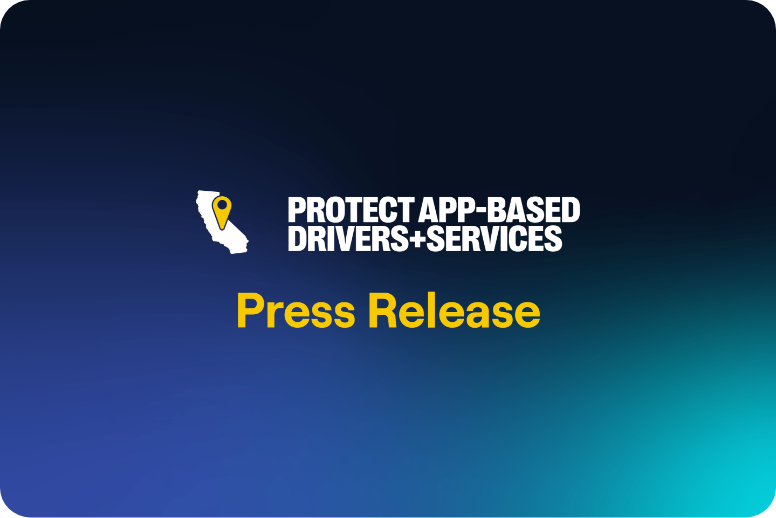Opponents argue fewer jobs is “reasonable” and no “harm” in job losses
SACRAMENTO – An independent study from the Berkeley Research Group (BRG) found that an employment model for app-based rideshare and delivery services will have devastating consequences for drivers by eliminating hundreds of thousands of jobs during a recession. According to BRG, without Proposition 22, if an employment model was forced on app-based drivers:
- 80-90% of app-based driver jobs would disappear, resulting in the loss of hundreds of thousands of jobs
- The fewer drivers still working would earn significantly less as employees, dropping from today’s average of $19.55 an hour to $14.67 per hour.
- Approximately 80% of drivers work less than 20 hours per week, and a majority work less than 10 hours per week.
In contrast, a recent independent study from UC Riverside found that under Prop 22, app-based drivers would earn at least $25 per hour. Under Prop 22, drivers always receive guaranteed minimum earnings of 120% of minimum wage plus 30 cents per mile compensation toward expenses, with the potential to earn more and no limits on how much drivers can make.
“There’s a reason that by 6-to-1, app-based drivers overwhelmingly want to be independent contractors,” said Devin Richey, a father from Dublin, CA who does app-based delivery to earn extra income. “We know forced employment means lost jobs and lost income, and higher prices and less reliable service for our customers. That’s why more than 100,000 drivers support Prop 22.”
Opponents of Prop 22 have explicitly argued for the elimination of hundreds of thousands of jobs, saying eliminating jobs is “reasonable” and there would be no “harm” associated with hundreds of thousands of job losses. Here are some examples of what they’ve said:
Chris Benner – Losing Part-Times Drivers Is “Reasonable”
In a tweet from August 2020, UCSC professor Chris Benner, who led a poll that No on 22 has been using in its campaign, said, “losing some part-time drivers so that full-time drivers can make a living wage is a reasonable trade-off…”)
“… limits to the growth …” – Michael Reich, UC Berkeley Institute for Research
In a November 2019 Forbes article, Michael Reich, co-chair of the labor union-funded Center on Wage and Employment Dynamics at the UC Berkeley Institute for Research on Labor and Employment, decried the number of ride-hail vehicles in New York City and said, “…there need to be some limits to the growth.”
Matthew D. Goldberg – No “harm” in hundreds of thousands of job losses
In oral arguments in People of California v. Uber from August 2020, Matthew D. Goldberg from the Office of the San Francisco City Attorney said, “And it defies logic that that would somehow lead to hundreds of thousands of job losses. That can only be plausibly true if they’re counting the people who work, you know, less than five and ten hours a year. And, candidly, if those people sort of transition into more robust, fuller jobs and there are fewer of them, I see no real harms associated with that…” (People vs. Uber, San Francisco County Superior Court, Case #CGC-20-584402, Reporter’s Transcript of Proceedings, August 6, 2020)
“… they need to stop hiring drivers…” – Rideshare Drivers United founder
During a podcast in July 2019, Nicole Moore, organizer and co-founder of Rideshare Drivers United said, “…you have to put a limit on the number of cars in the road…you can’t just keep bringing on, you know, dozens of new drivers every day… they need to stop hiring drivers.”
About Proposition 22
Proposition 22 would ensure driver flexibility, by protecting the ability of California’s one million app-based drivers to choose to work as independent contractors while providing new earning guarantees and benefits. These include:
- Prop 22 improves the quality of app-based work by requiring app-based platforms to provide drivers:
- Guaranteed minimum earnings (120% of California minimum wage), including compensation toward expenses
- Funding for new health benefits for drivers who work at least 15 hours a week
- Occupational accident insurance to cover injuries and illnesses on the job
- Protection against discrimination and sexual harassment
- Prop 22 implements strong new public safety protections:
- Recurring background checks of drivers
- Mandatory new safety courses for drivers
- Zero tolerance for alcohol and drug offenses
- Making it a crime to impersonate a driver
The Latest News

Press Releases
California Supreme Court Unanimously Upholds Prop 22 in Historic Ruling
Date: July 25, 2024 Contact: Molly Weedn, (415) 209-4217 [email protected] California Supreme Court Unanimously Upholds [...] Read more
Press Releases
PADS Responds to Conclusion of Oral Arguments on Prop 22
Date: May 21, 2024 Contact: Molly Weedn, (415) 209-4217 [email protected] The Coalition to Protect App [...] Read more